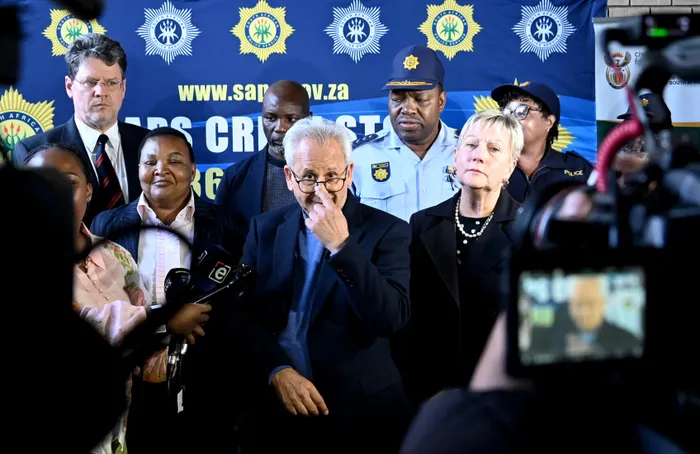
Acting Police Minister Firoz Cachalia warned that gangs in Cape Town are operating as “well-financed businesses” supplied with drugs and weapons.
Image: Ayanda Ndamane / Independent Media
Western Cape’s latest Policing Needs and Priorities (PNP) report has laid bare the scale of underfunding, police shortages, and persistent gang violence, with the provincial government warning that without urgent reform, communities will remain trapped in cycles of crime and fear.
Police Oversight and Community Safety MEC Anroux Marais said while the province does not hold operational control over the SAPS, the PNP provides the critical evidence base to influence national policing policy and the allocation of resources.
“Our power lies in policy influence, particularly through research-based, evidence-driven recommendations. The PNP reflects our oversight goal, bridging the gap between the lived realities of our communities and the policy frameworks that determine policing outcomes,” Marais said during the province’s latest safety digicon on Wednesday.
She explained that the report, grounded in Section 206 of the Constitution, is “the most important instrument in shaping the policy agenda, influencing national resource allocation, and ensuring that voices of communities are heard in the fight for a safer province”.
The 2025/26 focus is on reviewing the SAPS’s uptake of the 2019–2024 recommendations.
Marais said progress has been limited, with chronic underfunding at the heart of the problem.
“Police personnel numbers dropped from nearly 20,000 officers in 2016 to just 18,000 in 2022, even as the province’s population grew by 11.8%. In crime hotspots, the ratio is as high as one officer for 962 residents, compared with the national rate of one for 417.”
Acting Police Minister Firoz Cachalia, who visited Mitchells Plain and Mfuleni this week, echoed those concerns, warning that while additional officers had been deployed to stabilise gang-affected areas, the deeper issues remained unresolved.
“We must tell the truth. The truth is that the capabilities required for intelligence-driven operations to defeat the scourge of gang violence and organised crime are not yet fully in place,” he said.
Infrastructure and equipment shortages were also flagged in the PNP.
Marais said many police stations are in disrepair, vehicles are often out of service, and facilities are outdated.
She urged that resources be decentralised and modernised, while deployment patterns should better reflect crime data showing that most murders occur between 6pm and 3am over weekends.
Cachalia said the state needed to “look at crime intelligence where I think we have a major challenge”, and admitted that the battle against organised gangs, armed and well-resourced, “has not yet been won”.
The report highlights that 90% of gang murders in South Africa take place in the Western Cape.
Marais called for the anti-gang unit to be fully resourced, with greater investment in intelligence operations and stronger firearm control measures to tackle the flow of illegal weapons fuelling killings.
Cachalia agreed, describing gangs as “well-organised, structured as businesses, well-financed, and armed”, supplied by cross-border drug networks and a flood of weapons.
International organised crime expert Mark Shaw, of the Global Initiative Against Transnational Organised Crime, said South Africa ranked seventh globally on his organisation’s crime index, grouping it alongside countries such as Colombia, Mexico, and Italy.
He warned that the country required “a joined-up, strategic response” and praised the Western Cape’s willingness to pilot new approaches.
He highlighted a project in Grassy Park, where an experienced lawyer is stationed to help police draft stronger statements to improve prosecution rates in gang murder cases.
“What we found very quickly was that poor-quality statements meant cases were being thrown out. By providing legal expertise, we aim to build trust, improve casework, and ensure crimes have their day in court,” Shaw said.
Cachalia also emphasised that the response to gangs must extend beyond policing.
He called for coordination across the criminal justice cluster, from the National Prosecuting Authority and the Asset Forfeiture Unit to revenue authorities and the Financial Intelligence Centre.
“We have entrenched levels of poverty, high levels of unemployment, which create the conditions for gangs to recruit and pay young people who should be at school, but instead are being recruited into gangs,” he said.
Premier Alan Winde welcomed the PNP report as a tool to pressure the national government for more resources, while also pushing for innovative solutions at the provincial and municipal levels.
He pointed to the deployment of 700 new ward-based officers by the City of Cape Town, as well as the continued rollout of LEAP officers in crime hotspots.
“We cannot do this in silos. We have to find new ways of fighting crime using technology and data, and create a platform where all role-players, all spheres of government, civil society, and business come together to build safer communities,” Winde said.
He added that the province would continue to call for devolution of policing powers, arguing that the PNP’s detailed analysis of shortfalls at every police station demonstrated the urgency of giving provinces more authority to act.
Marais concluded that while some progress had been made, the growing complexity of crime required “a highly coordinated, integrated approach”.
“The Western Cape government will continue using this mechanism to hold stakeholders accountable, advocate for equitable policing, and pursue a shared vision of safer communities,” she said.
mandilakhe.tshwete@inl.co.za
Related Topics: